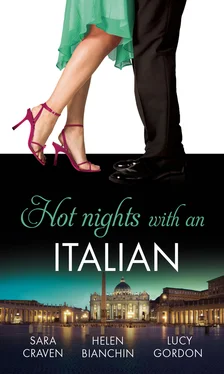‘Ah,’ said Mrs Morton. ‘And did she live locally? Are you familiar with the area?’
Marisa shook her head. ‘No, this is my first visit.’ And almost certainly my last . ‘I’m staying with—some people.’
‘My husband and I were fortunate enough to be able to retire here.’ Mrs Morton looked out at the bay with an expression of utter contentment. ‘We have an apartment nearby, but it only has a balcony, and I do miss my gardening. So I come here most days and do what I can.’ She sighed. ‘But as you see, it’s an uphill struggle.’
‘It must be tiring too.’ Marisa gestured towards the bench. ‘Shall we sit down—if you have time?’
‘My time is very much my own.’ Mrs Morton took a seat at the other end of the bench. ‘I have a most understanding husband.’
‘That’s—lovely for you.’ Marisa was suddenly conscious of the ring buried in her pocket. She added hurriedly, ‘But why has the garden been allowed to get into such a state?’ She glanced around her. ‘Doesn’t the owner—this Adriana—care?’
‘I think she would care very much if she was alive to see it, but she died a long time ago—over fifty years, I gather—and ownership of the property is no longer established.’
‘She didn’t have an heir?’ Marisa asked with a certain constraint. Another topic, she thought, she’d have preferred to avoid.
‘She and her husband were still newlyweds,’ Mrs Morton explained. ‘According to the local stories they made wills leaving everything to each other. And when he pre-deceased her she refused to make another.’
She shrugged. ‘Relatives on both sides have made legal claims to the estate over the years, but I suspect that most of them have died too by now, so the whole thing is in abeyance.’
‘Oh.’ Marisa drew a deep breath. ‘So that’s the tragedy. This wonderful place just left to—moulder away.’ She shook her head. ‘But why on earth didn’t this Adriana change her will?’
‘Oh, that’s quite simple,’ Mrs Morton said quietly. ‘You see, she never actually believed that her husband was dead.’
Marisa frowned. ‘But surely there must have been a death certificate at some point?’ she objected.
‘Under normal circumstances,’ the other woman said. ‘But sadly there was no real proof of death. Filippo Barzoni was sailing back from Ischia—he was a keen and experienced sailor, and had made the trip many times before—when a sudden violent squall blew up. Neither he nor his boat were ever seen again.
‘Some wreckage was washed up near Sorrento, but it was considered inconclusive as the storm had produced other casualties. However, no one but his widow believed that Filippo could possibly have survived. They were passionately in love, you see, and Adriana always claimed she would know, in her heart, if her husband were no longer alive. She felt most strongly that he was still with her, and that one day he would return.’
She sighed. ‘That’s why she had this bench placed here, so she could sit and watch the bay for a blue boat with maroon sails. She came every day to keep her vigil, summer and winter, and she refused to listen to any arguments against it. “One day, he will come back to me,” she used to say. “And he will find me waiting.”’
‘How awful,’ Marisa said softly. ‘Poor woman.’
Mrs Morton smiled again. ‘She didn’t see herself at all in that way, by all accounts. She was very calm, very steadfast, and doing what she believed in. As well as love, you see, she had faith and hope, so maybe she was one of the lucky ones.’
‘What happened in the end?’ Marisa asked.
‘She caught a chill, which she neglected, and which turned to pneumonia. She was taken to hospital, much against her will, and died a few days later.’ She added with faint dryness, ‘It’s said her last words were “Tell him I waited,” which one can believe or not.’
She put on her gloves and rose. ‘But this is far too lovely a day, and you’re much too young and pretty for any more sad stories about lost love. And I must get on with some work.’ She looked again at the sea. ‘However, this is a wonderful spot—especially to sit and think—and I hope I haven’t depressed you so much that you never come back.’
‘No,’ Marisa said. ‘I’d love to come and sit here—as long as I won’t be in the way.’
‘On the contrary, I think we can peacefully co-exist.’
‘And I have to say that it doesn’t actually feel sad at all.’
‘Nor to me,’ Mrs Morton agreed. ‘But I know some of the local people tend to avoid it.’
Marisa said slowly, ‘You said, when you saw me, that you thought for a moment Adriana had come back. Is that what people think?’
Behind her spectacles, Mrs Morton’s eyes twinkled. ‘Not out loud. The parish priest is very against superstition.’ She paused. ‘But I was surprised to see you, because so very few visitors come here. In fact, I always think of it as the village’s best-kept secret.’
‘Yet they told me?’ Marisa said, half to herself.
‘Well, perhaps you seemed like someone who needed a quiet place to think in the sunshine.’ As she moved away Mrs Morton glanced back over her shoulder. ‘But that, my dear, is entirely your own business.’
And co-exist, we did, Marisa thought, looking back with a pang of gratitude.
It had been late afternoon when she’d finally returned to Villa Santa Caterina, and she had fully expected to be cross-examined about her absence—by Evangelina if no one else, particularly as she’d failed to return to the villa for lunch. But not a word was said.
And no questions had been asked when she’d announced the following day that she was going for another walk, or any of the days that followed, when she’d climbed the hill to the house, passing her hours quietly on Adriana’s bench. She read, and sketched, and tried to make sense of what had happened to her and where it might lead.
Keeping, she realised now, a vigil of her own.
She’d invariably been aware of Mrs Morton’s relaxed presence elsewhere in the garden, and sometimes they had chatted, when the older woman took a break from her endeavours, having kindly but firmly refused Marisa’s diffident offer of help.
Conversation between them had been restricted to general topics, although Marisa had been aware that sometimes her companion watched her in a faintly puzzled way, as if wondering why she should choose to spend so much time alone.
Once, indeed, she’d asked, ‘Do your friends not mind seeing so little of you, my dear?’
‘No, not at all.’ Marisa looked down at her bare hand. ‘We’re not—close.’
And then, in the final week of the honeymoon, all her silent questioning was ended when she woke with stomach cramps and realised there would be no baby.
Realised, too, that she would somehow have to go to Renzo and tell him. And then, on some future occasion, steel herself to have sex with him again.
Both of those being prospects that filled her with dread.
She took some painkillers and spent most of the morning in bed, informing Evangelina that she had a headache, probably through too much sun.
‘Perhaps you would tell the signore ,’ she added, hoping that Renzo would read between the lines of the message and guess the truth. That as a result she might be spared the embarrassment of a personal interview with him. But Evangelina looked surprised.
‘He is not here, signora . He has business in Naples and will not return before dinner. Did he not say?’
‘I expect so.’ Marisa kept her tone light. Let’s keep up the pretence , she thought, that this is a normal marriage, where people talk to each other. After all, in a few more days we’ll be leaving . ‘I—probably forgot.’
Читать дальше












